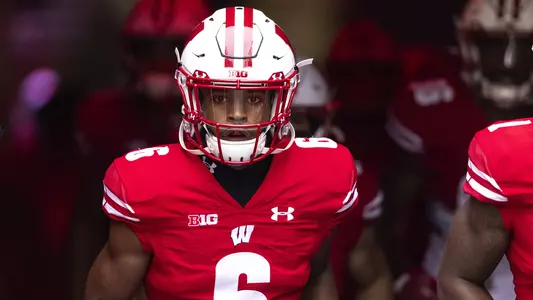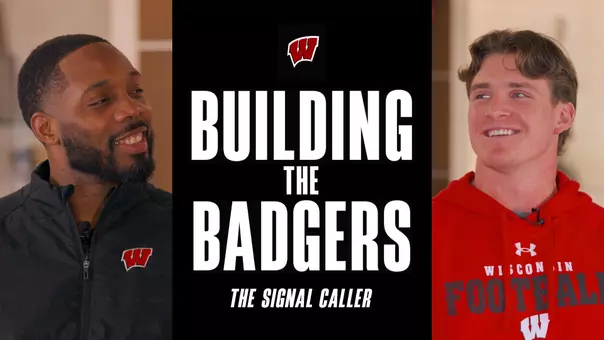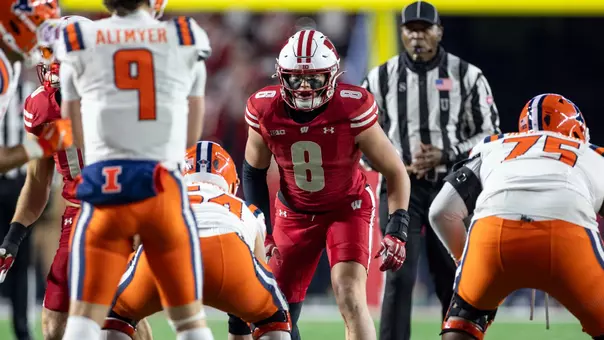
Lucas: Keeping receivers in check an inside job for Engram and Smith
September 23, 2021 | Football, Mike Lucas
Duo have embraced challenge of playing slot corner in Badgers’ nickel package
BY MIKE LUCAS
UWBadgers.com Senior Writer
MADISON, Wis. — With the proliferation of spread offenses in college football, the defensive antidote has been to bolster the coverage and flexibility against multiple wide receivers by adding a cornerback in a nickel package. Welcome to the slot corner, and its evolution.
Dean Engram and Alexander Smith have been interchangeable in that role. Since last spring, they've been tutored by Wisconsin's first-year cornerback coach Hank Poteat, who was a nickel or slot corner during the early stages of a decade-long NFL playing career.
"Both of them have a chip on their shoulder, they both really pay attention to the details," Poteat said of Engram and Smith. "They're always on top of understanding situational football — understanding where they fit within the scheme. They can do a lot of things, multiple things.
"Football matters to them. They come in and do the extra stuff.
"I just think they do a good job of feeding off each other."

Engram and Smith have attacked the slot corner assignment from vastly different starting points. Engram is from the East Coast and Columbia, Maryland. Smith is from the West Coast and Culver City, California. Geographical separation aside, they have reached a mesh point as teammates.
"We kind of think the same — we're able to see things similar," said Smith, a 5-foot-11, 176-pound junior who has appeared in 26 career games. "It allows us to be on the same page. So, it allows our communication to work a lot faster in the end to execute the defense better."
Both have been trained to play inside (nickel slot) or outside (base corner).
"Alex and I make each other better every day," said Engram, a 5-9, 168-pound sophomore who has played in nine career games, mostly on special teams. "Recently, I've been in the slot, and he has been more outside. But we can do both. Our versatility helps the defense out."
When an injured Faion Hicks was sidelined for the Sept. 11 Eastern Michigan game, Smith got his first career start at cornerback and played 18 snaps on defense, three more than Caesar Williams, the other starting corner. The overall numbers were skewed a bit in that EMU ran only 38 plays.
"I thought that was a great experience for him, seeing that he can be a contributor inside or outside," Poteat said. "He doesn't lack confidence. He's a really confident kid. And just being able to get out there really helped him out a lot in just getting a feeling for the flow of the game."
In underlining the value of the reps, Smith said, "It wasn't like I was being thrown out there the first time. I had already been in games. So, it was just a matter of getting my feet settled pretty early. I felt comfortable with my preparation and what I had seen on tape to go out there and fly around."

Prior to collecting a couple of tackles against Eastern Michigan, one shy of his career high set in last season's Duke's Mayo Bowl, the most notable entry in Smith's resume at Wisconsin was a blocked punt in a 2019 game at Ohio State that led to the Badgers' only score in a 38-7 loss.
On the patience needed to toil mainly on special teams until finally getting a crack at the rotation and eventually the starting lineup (due to Hicks' injury), Smith said, "You just have to wait for your time and when your opportunity comes, you've just got to be ready for it and seize it.
"Getting that first start, seeing your name called up on the (video) board and running out there for that first play, was great. It was amazing. I wouldn't say that I was nervous. But like always there are little butterflies in your stomach before every game. Just those first play jitters."
Like many athletes, Smith played on both sides of the ball growing up. He was a two-year captain and starter at wide receiver and defensive back (nine career picks) on the Culver City varsity. In middle school, he always used to bring juice for his lunches and the nickname stuck as a prep. Juice Smith.
"It kind of translated to football because I always would bring juice," said Smith, whose godbrother, Akili Smith, the ex-Oregon quarterback, was the third player taken in the '99 draft by the Cincinnati Bengals.
Looking back fondly on growing up in Culver City — the home of Sony Pictures Studios (formerly MGM) where Aaron Rodgers taped his "Jeopardy!" shows — Smith said, "The weather is always good, the beach is not too far and the people in that city have helped change my life. I love that place."
Smith and Engram have both loved feeding off Poteat's teaching approach in developing a "dog mentality" or mindset. Poteat, 44, has consistently talked about how that approach shouldn't change regardless of the game's circumstances. Up by 20, or down by 20, the mindset should be the same.
On what such a mentality entails, Engram said, "Discipline, attitude, work ethic and grit. That's our mindset going into the game. We want to challenge guys (receivers) and make them earn everything. If they can do it once, make them do it again. We have to have that next play mentality."
Slot corners, in particular, must be able to handle a slot receiver's two-way go.
"You've got to know where your help is and you want to funnel them to where your guys are going to be," Engram said. "If you know he's got a two-way go, you've got to play it honest. Have good eyes and react. You don't want to be guessing or anticipating too much. Play with your eyes and feet."
Noted Poteat, "It comes down to film study and knowing how you fit within the scheme."
In this context, Notre Dame's wide receivers fit head coach Brian Kelly's offensive system.
"To me, they all stand out," said Poteat, who offered a "by the numbers" scouting report based on his own film study. "Number 0 (Braden Lenzy) has really good speed. Number 3 (Avery Davis) is really good in the slot. Number 4 (Kevin Austin) has the ability to use his size and highpoint it on deep throws."
Number 17 ain't bad, either. That would be former Badger quarterback Jack Coan, who has completed 63 percent of his passes for 828 yards (276.0 per game) and eight scores. Coan will share snaps with freshman Tyler Buchner, an up-tempo, dual-threat QB who's averaging 9.2 yards per carry.
"Obviously, they're both extremely talented," said Wisconsin defensive coordinator Jim Leonhard. "It's not a situation where there is a guy struggling and they have to go back and forth. They truly have two guys who present different types of issues for your defense.
"It just makes you be smart. You've got to identify that and kind of understand what they like to go to with each quarterback. When he (Buchner) has been in the game, they've created a lot of energy and had a lot of big plays … he changes the math in the run game."
Both Smith and Engram remembered being tested on the scout team by Coan during practices the year before. Recalled Engram with a smile, "I was just out there working hard and not really knowing what I was doing."

Engram's confidence has grown exponentially since them.
"I knew the reps in practice were going to pay off in the game, so I just had to trust that going into a game day," said Engram, who had 28 snaps on defense and 7 on special teams in the opener, and 22 snaps the second week, the most by any cornerback, to go along with 15 on special teams.
"You can't let the game speed you up or slow you down. You have to move at your own speed."
Although Engram has yet to be credited with a tackle over two seasons with the Badgers, he does have 14 punt returns, including a 20-yarder in the Eastern Michigan win. Returning kicks was a specialty that he mastered at Gonzaga College High School (Washington, D.C.).
"I love playing on punt return," he said. "The first thing is secure the football and make sure it gets back into the offense's hands. If I get a chance to return it, I'm trying to get us good field position. The quickest path to the end zone is a straight line. I don't want to be running side-to-side too much."
Engram can draw from the experience of Poteat, who returned 77 punts during his NFL career. As a Pittsburgh Steelers rookie in 2000, he had a 53-yard punt return TD in the final game at Three Rivers Stadium. After scoring, he ran to the stands and gave the ball to his dad, and they embraced.
"Dean has pretty good instincts and a feel for it," said Poteat. "He's a coach's kid. He wants to be a coach at some point. He knows what his strengths and weaknesses are and how he has to go about studying and preparing every week. He does a good job of attacking whatever he needs help with."
In 2013, Poteat was a graduate assistant on Paul Chryst's coaching staff at the University of Pittsburgh. Engram's, dad, Bobby Engram, was Chryst's wide receivers coach. The following season, Engram moved from Pitt to the Baltimore Ravens, where he has been an assistant ever since.
Dean Engram will be the second Engram to play on the Soldier Field turf. In 1996, the Chicago Bears drafted Bobby Engram, a three-time All-American at Penn State, in the second round. Engram played five of his 14 NFL seasons with the Bears. He ended up with 650 career catches for 7,751 yards.
Bobby and wife Deanna attended the 2021 opener at Camp Randall Stadium.
"Even though they both graduated from Penn State, they had on their Wisconsin red, they're all Badgers now," Dean said. "He was never an official coach for any of my teams. But he would just tell me to have fun with the game. He wanted to make sure I always loved the game."
Nobody loved watching Dean play more than his older sister, Bobbi, who had a long battle with sickle cell disease. Bobbie passed away prior to the start of Dean's senior year of high school in 2018. She was 20 and an honors student in journalism at Towson University. She's still an inspiration.
"I think about her every day," Dean said. "She was my best friend, my first rock. We were 20 months apart in age. People thought we were twins. As we were moving from state to state with my dad playing in the league, we didn't have to worry about making friends. It was just me and her."
More than 15 years ago, Bobby Engram established a foundation to elevate sickle cell awareness and raise money for research. It was renamed after Bobbi following her passing. In partnership with the American Red Cross, there's an annual 5K run/walk honoring her spirit and memory.
"She was sitting in her hospital room, and she told my parents, 'I want to make it so other kids don't have to deal with this, I want to make it so nobody has to go through the pain,'" Dean recalled. "That's when the foundation got started up. It was always to create awareness.
"She had an impact on everybody just by the type of person that she was," he went on. "I've always loved football. But when you get to this point, you've got to find your 'Why.' My why before she passed away was my sister. And after she passed, it's still my sister."
Asked what Bobbi would think about "baby" brother getting a chance to impact a college football game, at the same venue that their dad once played at professionally, he said, "Whether I was playing or I was on the sideline, she was the same way, she'd be saying, 'Yay, Deano … yay, Deano.'"
Engram paused.
"I can still hear her now telling me that she's proud of me.' That makes it even more worth it."


















